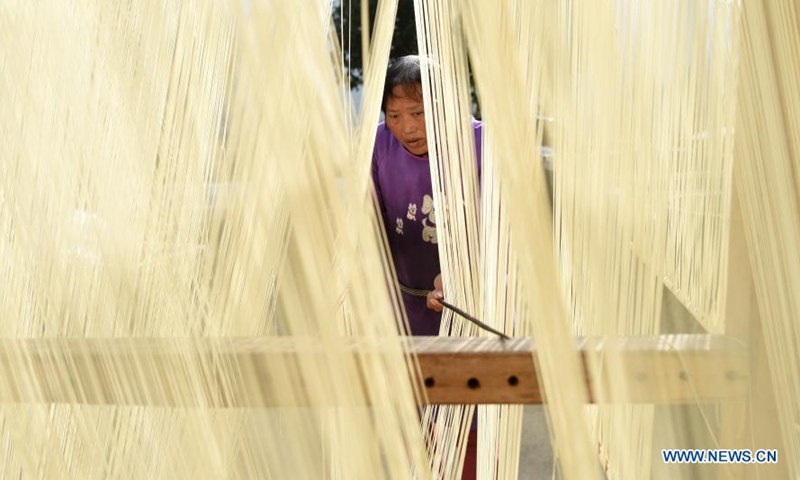
He Yunxiao airs handmade noodles at Longmen Village, Majian Township, Zhuji City of east China's Zhejiang Province, Jan. 29, 2021. There are more than a dozen steps in the traditional process of handmade noodles in Majian. These noodles, well noted for their length, symbolize longevity in the Chinese culture. Longmen Village alone turns out about 1,000 kilograms of handmade noodles a day, and brings in an annual income of some 2 million yuan (310,000 U.S. dollars). (Xinhua/Han Chuanhao)
A projection by a prominent Chinese economist that China can achieve high-income country status by 2025 has drawn attention to high-quality development, reform and avoiding the dreaded middle-income trap, with Chinese economists emphasizing the necessity of deepening reforms.
China is expected to enter the ranks of high-income economies during the 14th Five-Year Plan (2021-25) period, said Justin Lin Yifu, a standing committee member of the Chinese People's Political Consultative Conference (CPPCC) National Committee, and dean and professor at the Institute of New Structural Economics of Peking University.
"This will be an important milestone in the history of the human economy," he said.
Lin said that the optimistic prognosis is based on China's complete industry chains, rich industrial range, and advantages in new technologies including 5G and artificial intelligence.
A high-income economy is defined by the World Bank as a country with a gross national income per capita of $12,536 or more in 2019. In 2020, China's GDP exceeded 100 trillion yuan ($15.37 trillion), with per capita GDP exceeding $10,000 for a second consecutive year.
Cong Yi, a professor at the Tianjin University of Finance and Economics, told the Global Times on Wednesday that achieving such a status by 2025 will mean that China successfully avoids the so-called "middle-income trap", enters the lower echelon of the so-called high-income country group, and becomes the first over-1-billion-population high-income country in the world.
"That threshold cannot be achieved without further deepening reforms, and the Chinese government will face difficulties like no other, due to China's huge population base and regional development gaps," Cong said.
"There is a certain level of palpable confidence in Professor Lin's projection," Cong said.
From its successfully experience in poverty alleviation, the Chinese approach will be one that is not fully reliant on market forces but one that tries to make the best use of the potential of the government forces, Cong said, adding that China has already grasped the methodology.
Lin pointed out that there are still problems to be solved in terms of economic development, such as income gaps, urban-rural gaps, environmental pollution and an aging population.
"We should make good use of the dual circulation economy mode, be more open to the international economy, and at the same time, let common people share the fruits of economic development," Lin said.
In terms of an aging population, Lin suggested raising the retirement age and transferring the rural labor force to the manufacturing industry in order to maintain the demographic dividend.
He added that China should continue to upgrade its industry structure from one that is labor-intensive to one that's capital-intensive, and onward from that to technology-intensive industries, and also from low value-added manufacturing industries to high value-added manufacturing industries, to capture the dividends of economic growth.
Wan Zhe, a professor at Beijing Normal University, noted that even after China enters the club of high-income countries, there could be issues, such as the rich-poor divide and class rigidity, that still haunt the country.
"Some of the issues faced by those countries that fell into the middle-income trap won't happen to China, but China will also have its own real-world issues to deal with," Wan told the Global Times on Wednesday.
The US, which sits on top of the so-called high-income country list, is not free of problems, as demonstrated by its tumult in recent years, Wan pointed out.
Wan said while crossing that threshold will be one more reassuring moment for the Chinese people, they will be more preoccupied with the issues of per capita income, income distribution, social mobility, public welfare and inflation.
"Even as China breaches that threshold, it won't be an 'I am a different man' experience to people in China," Wan said, as by 2025, Chinese people's livelihoods should be continually improved and China should still be the world's second-largest economy.
Focusing on its own business and setting out to tackle structural issues will take priority over chasing GDP figures for the Chinese government, Wan predicted.




